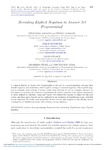Revisiting Explicit Negation in Answer Set Programming

Use this link to cite
http://hdl.handle.net/2183/24189Collections
- Investigación (FIC) [1685]
Metadata
Show full item recordTitle
Revisiting Explicit Negation in Answer Set ProgrammingAuthor(s)
Date
2019-09Citation
AGUADO, F., CABALAR, P., FANDINNO, J., PEARCE, D., PÉREZ, G., & VIDAL, C. (2019). Revisiting Explicit Negation in Answer Set Programming. Theory and Practice of Logic Programming, 19(5-6), 908-924. doi:10.1017/S1471068419000267
Abstract
[Abstract] A common feature in Answer Set Programming is the use of a second negation, stronger than default negation and sometimes called explicit, strong or classical negation. This explicit negation is normally used in front of atoms, rather than allowing its use as a regular operator. In this paper we consider the arbitrary combination of explicit negation with nested expressions, as those defined by Lifschitz, Tang and Turner. We extend the concept of reduct for this new syntax and then prove that it can be captured by an extension of Equilibrium Logic with this second negation. We study some properties of this variant and compare to the already known combination of Equilibrium Logic with Nelson’s strong negation.
Keywords
Answer set programming
Non-monotonic reasoning
Equilibrium logic
Explicit negation
Non-monotonic reasoning
Equilibrium logic
Explicit negation
Editor version
Rights
Atribución 3.0 España
ISSN
1475-3081
1471-0684
1471-0684






